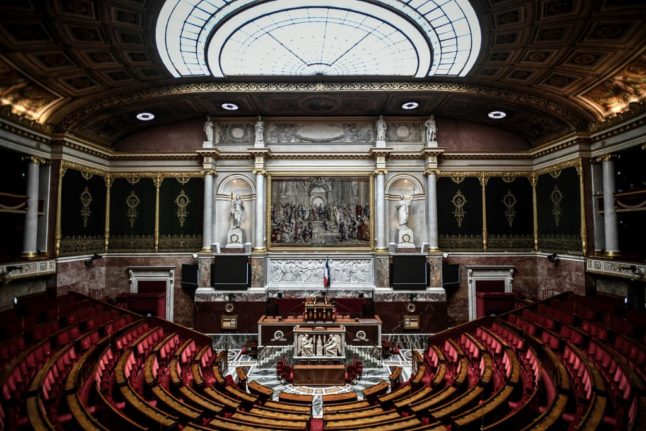Macron finds himself in an unenviable position.
His Ensemble group only won 245 of the deputé seats in the Assemblé Nationale during the parliamentary elections – that makes Ensemble the largest group, but falls significantly short of the 289 needed to govern with an absolute majority.
This will make Macron’s next five years in office considerably more challenging, marked by concessions, deals, and compromises with opposing parties if he wants to pass any legislation.
So, could Macron simply dissolve parliament and call a snap election? While the answer is technically yes, the “how” and “when” parts of the equation are a bit more complicated, and not all experts agree.
When could this happen?
Guillaume Tusseau, a professor of public law at Sciences Po Paris, told French newspaper Le Figaro that Article 12 of France’s Constitution says that “the President of the Republic may, after consultation with the Prime Minister and the presidents of the assemblies, pronounce the dissolution” of the latter.
The text does provide three safeguards for the procedure: It is forbidden to resort to it when the exceptional powers of Article 16 of the constitution are in force (basically, not allowed during a State of Emergency); when an interim president is in charge, or if a dissolution has already taken place within that year.
READ MORE: French elections: What happens next after Macron loses majority in parliament?
The one-year limit is causing some dispute – does this mean that Macron would have to wait until June 2023 to dissolve parliament, or can he do it now?
According to Tusseau, since the newly elected parliament was formed via the classical democratic process (and not through dissolution), Macron would not need to wait a year. Most experts agree with this interpretation, but not all.
If he did have to wait a year, the timescale on that is confusing too.
The text in the Constitution uses the term “l’année qui vient” (the coming year) to place a timeline on when dissolution can take place: some understand it as the calendar year (as in, prior to January 1st, 2023), while others understand it to mean a full year in duration later (as in June 20th, 2023).
How does he dissolve parliament?
Assuming Macron does have the constitutional right, how does he go about dissolving parliament?
He would need to first consult with the prime minister (Élisabeth Borne), the president of the Senate (Gérard Larcher, who is part of the opposition Les Républicains party) and the president of the Assemblée nationale.
This is where it gets tricky: Richard Ferrand, the current president of the Assembly was defeated in his re-election campaign, so his post is currently empty. A vote is scheduled on June 28th, where the deputés (MPs) will come together to elect a new candidate.
However, if Macron did choose to start the dissolution process, the new parliamentary elections would need to take place between 20 and 40 days after the dissolution, according to the Constitution.
Is it likely that he will?
Moving away from the technicalities, there is also a political aspect. Macron would do so assuming that a new vote would give him the majority that he needs – but would it?
Many see it as “political suicide,” including some in his own camp.
So far, government spokesperson, Olivia Gregoire, has come out and said it is “not on the table.” While Agriculture Minister, Marc Fesneau said dissolving parliament would be “quite destructive” and that “the voters have decided.”
Macron himself gave a brief speech to the nation on Wednesday night, speaking of the need to “build a different style of government” that involved more “dialogue and listening”.
He did not mention dissolving parliament, but did give a veiled ultimatum to opposition parties to state their position.
Macron has the option of ruling in a minority government for now – trying to put together temporary alliances to get important bills such as the latest package of financial aid for households during the cost-of-living crisis – and then dissolving parliament at a later date, perhaps in the autumn.
Many experts believe that he will call an election either in the fall or the first half of 2023.
Is there precedent for this?
The decision to dissolve parliament would be highly controversial, especially so close to the most recent parliamentary election, but it is not unprecedented in French history.
Three other French presidents have dissolved the Assemblée nationale during France’s Fifth Republic: Charles de Gaulle in 1961 and again in 1968; François Mitterrand in 1981 and 1988; and finally Jacques Chirac in 1997.
Sometimes this has worked out as the presidents intended, but not always – in 1997 Chirac’s intention of gaining a larger majority was flipped on its head when the left actually came out with the majority, forcing him into a cohabitation with Lionel Jospin.
Vote of no confidence
Finally, you might be wondering, can Macron himself be the subject of a vote of no confidence?
As Macron is the President of the Republic, and not the prime minister (who is tasked with domestic affairs), he cannot suffer a no-confidence vote himself. However, his government – represented by the Prime Minister – can.
The hard-left party,La France Insoumise says it intends to call a vote of no confidence against prime minister Elisabeth Borne on July 5th, the day she is set to announce her government’s programme. However the party – and even the leftist alliance that it was part of during the election campaign – does not have enough seats in parliament to push this through on its own.



 Please whitelist us to continue reading.
Please whitelist us to continue reading.
Member comments